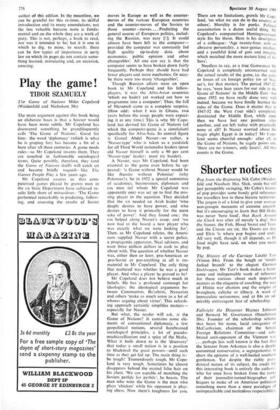Shorter notices
Pop from the Beginning Nik Cohn (Weiden- feld and Nicolson 36s). Slick, snide but still just perceptibly swinging, Mr C,ohn's history of pop provides some handy grid references for travellers lost in these bizarre territories. The jargon is of a kind to give your average non-groupie moments of extreme anguish. but it's encouraging to learn that Bill Haley was never 'hero food', that Rock Around the Clock was after all merely 'a dog', that the Stones, the Fish, Blood Sweat and Tears and the Cream are ox, the Doors are dire and Elvis is where pop begins and ends'. All very well, though it all depends, as Dr Joad might have said, on what you mean by pop.
The History of the Carriage Laszlo Tarr (Vision 84s). From the bough or 'simple forked branch' to the elegant German Stuhlwagen, Mr Tarr's book makes a hand- some and indispensable work of reference for those curious about such important matters as the etiquette of coaching, the uses of Hittite war chariots and the origins of brougham, caleche or tilbury. A work of immaculate seriousness, and at 84s an ad- mirably extravagant feat of scholarship.
Fulbright the Dissenter Haynes Johnson and Bernard M. Gwertzrnan (Hutchinson 50s). Founder of the scholarship scheme that bears his name, lucid antagonist of McCarthyism, chairman of the Senate Foreign Relations Committee—and cele- brated arch-opponent of the Vietnam war ... perhaps less well known is the fact that the Senator from Arkansas is also a deeply committed conservative, a segregationist, in short the epitome of a well-heeled southern gentleman. Yet despite the richly para- doxical nature of its subject, the credit for this interesting book is entirely the authors'. who for once have broken from the ranks of their journalist-turned-biographer col- leagues to make of an American politician something more than a mere paradigm of unimpeachable and meticulous respectability.


































 Previous page
Previous page